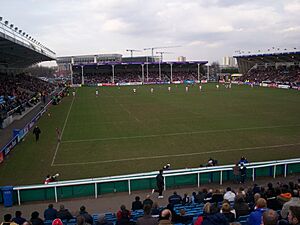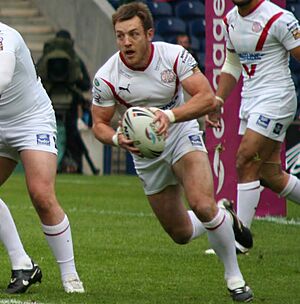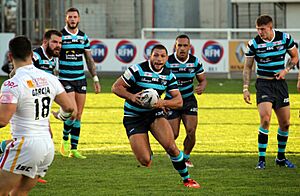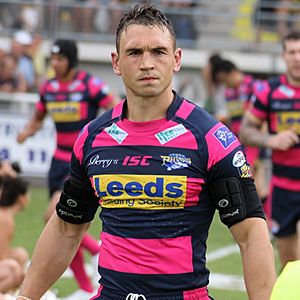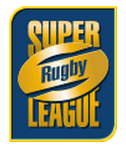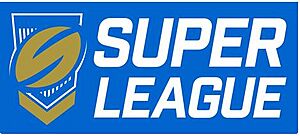Super League facts for kids
The Super League (also known as the Betfred Super League for sponsorship reasons) is a top professional rugby league competition. It's the highest level of rugby league in Britain, featuring twelve teams. Eleven of these teams are from Northern England, which is like the sport's home base, and one team is from southern France.
Super League started in 1996. Before that, the sport was played in winter, but with the new league, it switched to a summer season.
The regular season runs from February to September. Each team plays 27 games: 11 at home, 11 away, one at the special Magic Weekend event, and four extra games based on how well they did the year before. The top six teams then go into exciting play-offs. These play-offs lead to the Super League Grand Final, which decides who the champions are! As of 2024, teams don't get moved down to a lower league from Super League.
The Super League champions also get to play against the champions of Australia's National Rugby League in a big match called the World Club Challenge.
Since 1996, twenty-four different clubs have played in the Super League. Most are from England (nineteen), but there have also been three from France, one from Wales, and one from Canada. Only four clubs have won the Super League title: St Helens (10 times), Leeds Rhinos (8 times), Wigan Warriors (7 times), and Bradford Bulls (4 times).
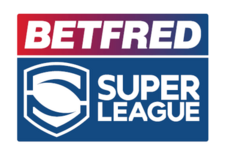 |
|
| Sport | Rugby league |
|---|---|
| Founded | 1996 |
| No. of teams | 12 |
| Country | |
| Most recent champion(s) |
(7th title) |
| Most titles | (10 titles) |
| TV partner(s) |
|
| Level on pyramid | 1 |
| Domestic cup(s) | Challenge Cup |
| International cup(s) | World Club Challenge |
Contents
Super League History
How Super League Started
In the 1950s, rugby league was super popular in Britain. But over the next twenty years, fewer people came to watch games. People started talking about a "Super League" in the 1970s to make the sport exciting again. By the early 1990s, things were still tough. Many stadiums were old, and only one team, Wigan, was fully professional.
In 1992, Maurice Lindsay, who was in charge of the Rugby Football League (RFL), brought up the idea of a Super League again. He wanted the sport to grow beyond just Northern England and for clubs to play in better stadiums.
A big boost came in the mid-1990s when a TV company, BSkyB (owned by Rupert Murdoch), offered a lot of money to broadcast the games. This deal helped make the Super League happen. It was decided that a 14-team Super League would start in 1996. The sport would switch from winter to summer, and all teams would become full-time professional.
The plan was for Super League to be a European competition. Rugby league was also popular in the South of France. So, Toulouse Olympique and Paris Saint-Germain were invited to join. Paris Saint-Germain was a new team created just for this league, using the same name and colors as the famous football club.
There were also ideas to merge some English clubs, like Castleford with Wakefield Trinity and Featherstone Rovers to form "Calder." But many fans didn't like these ideas because the clubs were old rivals and important to their local communities. So, the mergers didn't happen.
Before the Super League officially began, there were some changes to how teams moved between leagues. This caused some arguments, especially when Keighley won their league but weren't promoted, while London Broncos were moved up quickly to help the Super League get more national attention.
The 1995–96 season was the last one played in winter. It was a short season because the 1995 World Cup was happening in October.
First Seasons: 1996–1997
Super League finally kicked off in 1996 with 12 founding teams:
 Bradford Bulls
Bradford Bulls Castleford Tigers
Castleford Tigers Halifax
Halifax Leeds Rhinos
Leeds Rhinos London Broncos
London Broncos Oldham Bears
Oldham Bears- [[File:|16px|]] Paris Saint-Germain
 Sheffield Eagles
Sheffield Eagles St. Helens
St. Helens Warrington Wolves
Warrington Wolves Wigan Warriors
Wigan Warriors Workington Town
Workington Town
New rules were brought in, like squad numbers for players and a video referee for televised games. A "salary cap" was also introduced to stop clubs from spending too much money and to make the competition fairer. The league even tried to be more like American sports, with clubs using nicknames and seasons being called by Roman numerals (like Super League I for 1996).
The very first game was on March 29, 1996, where PSG beat Sheffield 30–24 in Paris. St Helens won the first Super League title, ending Wigan's long winning streak. Workington was moved down to a lower league.
In the second season, Bradford Bulls won the title. Paris Saint-Germain, after finishing near the bottom twice, was closed down.
Grand Final Introduced: 1998–2008
With Paris Saint-Germain gone, the league became mostly English teams. A big change in 1998 was that a "play-off" system would decide the champions, ending with a "Grand Final." This was a bit like how it used to be in rugby league, but it hadn't been used since 1973. The famous Old Trafford stadium became the home for the new Grand Final.
The first Grand Final at Old Trafford saw Wigan beat Leeds 12–8, giving Wigan their first league title in the new Super League era.
The league tried to expand to 14 teams in 1999, promoting Wakefield Trinity and adding a new club, Gateshead Thunder. St Helens won the Grand Final that year. However, Gateshead and Sheffield faced financial problems and merged with other clubs, so Super League went back to 12 teams after just one season.
Relegation (teams moving down a league) was brought back in 2001. In 2002, the play-offs were expanded to include six teams. In 2003, the League Leaders Shield was introduced for the team that finished top of the league after the regular season.
In 2005, a French club, Catalans Dragons, joined Super League. They were new, formed in 2000, and were allowed to stay in the league for their first three years without being relegated. This meant two English teams were relegated in 2005 to make space.
By the mid-2000s, the quality of play was better, and more fans were coming to games. However, many clubs still had old stadiums, and the sport was still mostly played in Northern England. A few teams, like Bradford, Leeds, Wigan, and St Helens, were winning most of the titles.
Expansion and Licensing: 2009–2014
To help Super League grow and improve, the RFL introduced a new system called "licensing" in 2009. Instead of teams being promoted or relegated just based on how well they played, clubs had to apply for a license to be in Super League. These licenses were given out based on things like stadium facilities, money, marketing, and how strong their teams were, including their young players. Licenses lasted for three years.
In 2008, the RFL announced that Super League would expand to 14 teams in 2009, and the play-offs would include 8 teams. The 12 existing Super League teams got licenses, plus two new teams from a lower league: Celtic Crusaders (the first Welsh team in Super League) and Salford.
Some teams like Featherstone Rovers, Halifax, Leigh, and Widnes didn't get licenses, which made some of their fans and chairmen very upset.
During this time, Leeds and St Helens were very strong, winning many titles. By 2011, Celtic Crusaders faced money problems and had to leave the league.
For the 2012–2014 seasons, Widnes was awarded a Super League license. Crusaders withdrew their application because of financial issues.
Super 8s: 2015–2018
After a few years, the licensing system wasn't as popular. Some felt that clubs with old stadiums were still getting licenses over other teams that might have been better. Clubs in the lower leagues also felt that their success on the field wasn't being rewarded.
So, in 2013, the Super League clubs decided to change things again for 2015. The league would go back to 12 teams, and promotion and relegation would return.
A new and exciting league structure was created called the "Super 8s." Here's how it worked:
- All 12 Super League teams and 12 Championship teams played each other twice in a regular season.
- After that, the 24 clubs split into three groups of eight.
- The top eight Super League clubs played each other again in the "Super 8s" to decide the champions.
- The bottom four Super League clubs and the top four Championship clubs played in "The Qualifiers." These games decided which four teams would play in Super League the next year. This was often very tense!
To get ready for this new system, two teams were moved down from Super League in 2014: London Broncos and four-time champions Bradford Bulls.
In 2015, a "Marquee Player" rule was introduced. This allowed clubs to sign one very expensive player whose salary wouldn't count fully towards the team's salary cap, as long as the club could afford it. This rule aimed to bring in more star players.
The first Super 8s season was won by Leeds Rhinos. In 2016, Hull Kingston Rovers were relegated after losing a dramatic "Million Pound Game" to Salford.
By 2018, people started to question if the Super 8s system was working well. Attendance at games after the split sometimes dropped, and there was more excitement about who would be relegated than about the Super League play-offs.
Changes and Challenges: 2019–2021
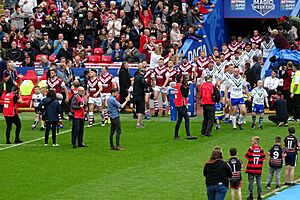
In September 2018, the Super League clubs decided they wanted more control over TV deals and sponsorship money. They voted to separate from the RFL and also to get rid of the Super 8s. They went back to a simpler system where one team would be promoted and one team relegated each year.
The Super League appointed a new Chief Executive, Robert Elstone. He brought in new branding and new rules, like a "shot clock" to speed up the game and "golden point" extra time to avoid draws.
After a good 2019 season, the 2020 season was stopped because of the COVID-19 pandemic. The Toronto Wolfpack team, from Canada, couldn't return to finish the season because of the financial difficulties.
In December 2020, Leigh Centurions took Toronto's place for the 2021 season. In February 2021, Robert Elstone resigned. The TV deal for Super League was also cut, which led to more talks about the Super League and RFL working together again.
Working Together Again: 2022–Present
On March 22, 2022, the RFL and Super League officially decided to work together again. A new company was also set up to handle the business side of the sport.
In May 2022, the RFL signed a 12-year deal with a sports marketing company called IMG. IMG announced plans to bring back a form of licensing, but it would be different.
Clubs across all three leagues (Super League, Championship, and League One) would be given a grade: A, B, or C.
- Clubs with an A grade would be in Super League and wouldn't be relegated.
- The rest of Super League would be made up of the highest-ranked B-grade clubs, who could move between Super League and the Championship depending on their rating.
- C-grade clubs would play in the Championship and League One.
The big goal is to eventually have a Super League with 12 A-grade clubs.
IMG announced the grading rules in March 2023. Clubs are judged on things like their fan base, how well they play, their money situation, their stadium, and the area they represent.
On July 28, 2025, Super League leaders voted to expand the league to 14 teams starting with the 2026 season. This means at least two teams from the Championship will join the Super League.
How Super League Works
Regular Season Games
There are 12 clubs in the Super League. The season usually runs from February to September. Each club plays every other club twice: once at their home stadium and once at the opponent's stadium.
Teams also play five extra "Loop Fixtures." These are decided by how well teams finished in the league the previous season. One of these extra games is played at the special Magic Weekend event. In total, each club plays 27 games.
Teams get two points for a win. If a game is a draw at the end of normal time, they play 20 minutes of "Golden point" extra time. If it's still a draw after that, both teams get one point. No points are given for a loss.
Teams are ranked by their points. If points are tied, they look at the "points difference" (points scored minus points given up), and then total points scored. The team that finishes top after all 27 games wins the League Leaders' Shield.
Play-offs for the Title
The play-offs have changed their format over the years. Right now, after all 27 regular season games are played, the top six teams qualify for the play-offs.
In the first round, the 3rd-place team plays the 6th-place team, and the 4th-place team plays the 5th-place team. The winners of these games then go to the semi-finals, where the 1st and 2nd-place teams are waiting. The two winners of the semi-finals then meet in the Grand Final.
The Grand Final
The Grand Final is the most important game of the Super League season. It decides who the champions are! It's held every year at Old Trafford stadium in Manchester, except for 2020 when it was held in Hull without fans because of the COVID-19 pandemic.
| City | Stadium | Years |
|---|---|---|
| Old Trafford | 1998–2019, 2021–present | |
| MKM Stadium | 2020 |
Super League Teams
Teams Playing Now
| Super League clubs | ||||||||
|---|---|---|---|---|---|---|---|---|
| Colours | Club | Established | Location | Stadia (Capacity) | Titles (Last)d |
|||
| Castleford Tigersa | 1926 | Castleford, West Yorkshire | Mend-A-Hose Jungle (11,775) | 0 (N/A) | ||||
| Catalans Dragons | 2000 | Perpignan, Pyrénées-Orientales | Stade Gilbert Brutus (13,000) | 0 (N/A) | ||||
| Huddersfield Giantsc | 1864 | Huddersfield, West Yorkshire | Accu Stadium (24,500) | 7 (1962) | ||||
| Hull FCc | 1865 | Kingston upon Hull, East Yorkshire | MKM Stadium (25,400) | 6 (1983) | ||||
| Hull Kingston Rovers | 1882 | Kingston upon Hull, East Yorkshire | Sewell Group Craven Park (12,225) | 5 (1985) | ||||
| Leeds Rhinosabc | 1870 | Leeds, West Yorkshire | Headingley Stadium (19,700) | 11 (2017) | ||||
| Leigh Leopardsc | 1878 | Leigh, Greater Manchester | Leigh Sports Village (12,005) | 2 (1982) | ||||
| Salford Red Devils | 1873 | Salford, Greater Manchester | Salford Community Stadium (12,000) | 6 (1976) | ||||
| St Helensabc | 1873 | St Helens, Merseyside | Totally Wicked Stadium (18,000) | 17 (2022) | ||||
| Wakefield Trinity | 1873 | Wakefield, West Yorkshire | Belle Vue (9,333) | 2 (1968) | ||||
| Warrington Wolvesabc | 1876 | Warrington, Cheshire | Halliwell Jones Stadium (15,200) | 3 (1955) | ||||
| Wigan Warriorsabc | 1872 | Wigan, Greater Manchester | Brick Community Stadium (25,133) | 24 (2024) | ||||
- Notes
-
-
- a: Was one of the first teams in Super League
- b: Has played in every Super League season since 1996
- c: Was one of the original 22 RFL teams
- d: Includes titles won before Super League started in 1996.
-
| Current Champions |
Past Super League Teams
| Club | Seasons in Super League | First season in Super League |
Last season in Super League |
Titles (Most recent top division title) |
Location |
|---|---|---|---|---|---|
|
|
21 | 1996 | 2024 | N/A | |
|
|
19 | 1996 | 2014 | 2005 | |
|
|
11 | 2002 | 2018 | 1989 | |
|
|
8 | 1996 | 2003 | 1985–86 | |
|
|
4 | 1996 | 1999 | N/A | |
|
|
3 | 2009 | 2011 | N/A | |
|
|
2 | 1996 | 1997 | 1956–57 | |
|
|
2 | 1996 | 1997 | N/A | |
|
|
1 | 1999 | 1999 | N/A | |
|
|
1 | 1996 | 1996 | 1950–51 | |
|
|
1 | 2020 | 2020 | N/A | |
|
|
1 | 2022 | 2022 | N/A |
- § Means the club is no longer active
Super League Winners
Champions of Super League
For the first two Super League seasons, the champion was simply the team that finished top of the league. From 1998 onwards, a play-off series and a Grand Final decided the champion.
| Club | Winners | Runners-up | Winning seasons |
|---|---|---|---|
| 10 | 5 | 1996, 1999, 2000, 2002, 2006, 2014, 2019, 2020, 2021, 2022 | |
| 8 | 3 | 2004, 2007, 2008, 2009, 2011, 2012, 2015, 2017 | |
| 7 | 7 | 1998, 2010, 2013, 2016, 2018, 2023, 2024 | |
| 4 | 3 | 1997, 2001, 2003, 2005 | |
| 0 | 4 | N/A | |
| 2 | |||
| 1 | |||
League Leaders' Shield Winners
The League Leaders' Shield is given to the team that finishes top of the Super League after the regular season. It was first awarded in 2003.
| Club | Shield Wins | Winning Years | |
|---|---|---|---|
| 1 | 8 | 2005, 2006, 2007, 2008, 2014, 2018, 2019, 2022 | |
| 2 | 5 | 2010, 2012, 2020, 2023, 2024 | |
| 3 | 3 | 2004, 2009, 2015 | |
| 4 | 2 | 2011, 2016 | |
| 5 | 1 | 2003 | |
| 2013 | |||
| 2017 | |||
| 2021 |
Super League Awards
The Super League Trophy
The team that wins the Grand Final gets the Super League Trophy. This is seen as the biggest prize. Each year, the winning team's name, the year they won, and their captain's name are carved onto the trophy.
Wigan are the current champions.
St Helens holds the record for winning the most Super League titles, with ten wins. Leeds captain Kevin Sinfield has captained the most winning teams, leading Leeds to seven Grand Final victories.
Several teams have played in the Grand Final but never won, including Hull F.C. (2006), Warrington (four times), Castleford (2017), Salford (2019), Catalans (2021), and Hull KR (2024).
Steve Prescott Man of Steel Award
This award is given every year to the best player in the Super League season. It's been around since 1977, even before Super League started. In 2014, it was renamed in honor of Steve Prescott, a famous rugby league player.
Albert Goldthorpe Medal
The Albert Goldthorpe Medal is an award voted for by sports reporters. After every regular season game, reporters pick the top three players. The player with the most points at the end of the season wins.
Super League Dream Team
Each season, a "Dream Team" is chosen. This is a team of the best thirteen players in their positions, voted for by sports journalists. Here is the 2024 Dream Team:
| Player | Team | Appearance | |
|---|---|---|---|
| 1 | 1 | ||
| 2 | 1 | ||
| 3 | 1 | ||
| 4 | 2 | ||
| 5 | 1 | ||
| 6 | 1 | ||
| 7 | 1 | ||
| 8 | 1 | ||
| 9 | 1 | ||
| 10 | 3 | ||
| 11 | 1 | ||
| 12 | 1 | ||
| 13 | 1 |
Super League Coaches
Coaches Who Won Super League Titles
Sixteen different coaches have won the Super League title. Ten of them are from Australia, five from England, and one from New Zealand.
Super League Players
Most Appearances
This list includes games where players started or came on as a substitute.
| Rank | Player | Apps |
|---|---|---|
| 1 | 495 | |
| 2 | 454 | |
| 3 | 452 | |
| 4 | 442 | |
| 5 | 438 | |
| 6 | 432 | |
| 7 | 430 | |
| 8= | 429 | |
| 8= | 429 | |
| 10 | 419 | |
|
|
||
Most Tries Scored
| Rank | Player | Tries |
|---|---|---|
| 1 | 260 | |
| 2 | 251 | |
| 3 | 247 | |
| 4= | 199 | |
| 4= | 199 | |
| 6= | 196 | |
| 6= | 196 | |
| 8 | 186 | |
| 9= | 173 | |
| 9= | 173 | |
|
|
||
Most Points Scored
| Rank | Player | Points |
|---|---|---|
| 1 | 3,443 | |
| 2 | 2,462 | |
| 3 | 2,415 | |
| 4 | 2,376 | |
| 5 | 2,290 | |
| 6 | 2,280 | |
| 7 | 2,267 | |
| 8 | 2,240 | |
| 9 | 2,202 | |
| 10 | 1,692 | |
|
|
||
Winning Captains
Twelve different players have been captains of teams that won the Super League.
| Captain | Wins | Winning years | |
|---|---|---|---|
| 1 | 7 | 2004, 2007, 2008, 2009, 2011, 2012, 2015 | |
| 2 | 4 | 2010, 2013, 2016, 2018 | |
| 3 | 4 | 2019, 2020, 2021, 2022 | |
| 4 | 3 | 1999, 2000, 2002 | |
| 5 | 3 | 1997, 2001, 2003 | |
| 6 | 2 | 2023, 2024 | |
| 6 | 1 | 1996 | |
| 7 | 1 | 1998 | |
| 8 | 1 | 2005 | |
| 9 | 1 | 2006 | |
| 10 | 1 | 2014 | |
| 11 | 1 | 2017 |
Super League Sponsors
Since it started in 1996, Super League has had different sponsors. The first sponsor was Stones Bitter. The league has almost always had a main sponsor, except for the 2013 season.
| Period | Sponsor | Name |
|---|---|---|
| 1996–1997 | Stones Bitter | Stones Super League |
| 1998–1999 | JJB Sports | JJB Super League |
| 2000–2004 | Tetley's Bitter | Tetley's Super League |
| 2005–2011 | Engage Mutual Assurance | Engage Super League |
| 2012 | Stobart Group | Stobart Super League |
| 2013 | no sponsor | Super League |
| 2014–2016 | First Utility | First Utility Super League |
| 2017–2026 | Betfred | Betfred Super League |
Super League also has other official partners and suppliers. For example, Steeden is the official supplier of rugby balls.
Super League Logos
The Super League has had three main logos. The first one was used from 1996 until 2016. It had a big "S" for Super League. The main sponsor's name would appear above the logo. The team that won the championship used to have a special ribbon around the logo on their shirts.
A new logo was introduced in 2017 as part of a big rebrand for British rugby league. This design was similar to the logos for the RFL and the England team. It had a rectangular shape, thirteen lines (for the thirteen players on a team), a chevron (a common design on rugby league shirts), and an "S" that looked like a ball. The champions got to wear a gold version of this logo.
Before the 2020 season, a brand new, simpler logo was revealed. In 2024, this logo was updated to have three different versions, one for each Super League competition: teal for men's, purple for women's, and green for wheelchair rugby league.
Super League Rules
Player Limits
The Rugby Football League has rules about how many players from outside Europe can play in Super League teams. Teams are allowed to have up to seven players who haven't been trained in Europe. A player is considered "federation-trained" if they have played in Europe for three years before they turn 21. This rule has changed a bit over the years.
Even after Brexit, players from European countries are still counted as "federation-trained" even if they are not British. There's also a "New Play Rule" that means players signed from a different sport don't count towards this limit.
Salary Cap Rules
A "salary cap" was first introduced in Super League in 1998. This rule limits how much money clubs can spend on player wages. From 2002, the cap became a fixed amount, which is currently £1.825 million for the top 25 players. This helps make the league fairer so that richer clubs can't just buy all the best players.
Here are some key points about the salary cap:
- The total earnings of a club's top 25 players can't go over £1.825 million.
- Clubs can only sign new players if they have enough room under the cap.
- Clubs can spend a small amount (£50,000) on players outside the top 25 who play at least one first-team game.
- Players who have played for the same club for at least 10 seasons have half their salary excluded from the cap for their 11th season and beyond, up to £50,000 per club.
- Clubs are allowed one "Marquee Player." This is a special player whose high salary doesn't fully count towards the cap, as long as the club can afford their wages.
In 2017, clubs agreed to increase the salary cap to £2.1 million by 2020 and allow clubs to sign a second marquee player.
Squad Announcements
Before each Super League game, every club must announce a squad of 19 players they will choose from. This announcement has to be made by 2:00 PM two days before the match.
Super League on TV and Radio
Television Coverage
Sky Sports has been showing Super League games live since the very first season in 1996. The current deal, which runs until 2026, means that for the first time, Sky Sports will show all six matches every week live!
In 2024, a special streaming service called Super League+ was launched. It shows four out of six matches live each week, with the other two available to watch 48 hours later.
For the 2024 season, the BBC also started showing ten matches, including regular season games and play-off matches. They also show extra games on the Red Button and iPlayer.
Sky Sports broadcasts live Super League games in the United Kingdom and Ireland. Games are usually on Thursdays and Fridays, and at different times on weekend afternoons.
| Duration | Broadcasters | Value per year | Games shown per year |
|---|---|---|---|
| 1996–1999 | Sky Sports | ~£17 million | ? |
| 1999–2003 | ~£12 million | ? | |
| 2004–2008 | ~£9 million | ? | |
| 2009–2011 | ~£18 million | 80 | |
| 2012–2016 | 100 | ||
| 2017–2021 | ~£40 million | 80 | |
| 2022–2023 | Sky Sports Channel 4 |
~£26 million | 66 + 10 |
| 2024–2026 | Sky Sports BBC Super League+ |
~£20 million | ~170 |
Highlights Shows
Before 2024, BBC Sport had a weekly highlights show called the Super League Show. It showed highlights of games and was very popular, especially in the North of England. It was also available on BBC iPlayer. However, the Super League Show was cancelled before the 2024 season because Sky Sports now shows every game live.
| Highlights programme | Duration | Broadcaster |
|---|---|---|
| Super League Show | 1999–2023 | BBC |
Watching Internationally
Super League games are shown live in many countries around the world by different broadcasters.
| Country/ Region | Broadcaster |
|---|---|
| Fox League, NITV | |
| Africa | ESPN Africa |
| Asia | Premier Sports |
| Fox Sports | |
| Sportsnet | |
| Caribbean | Sports Max |
| L'Équipe | |
| Sky Sport | |
| Pacific Islands | TVWan |
| Worldwide (Online) | SuperLeague+ |
Radio Coverage
Talksport is an official radio broadcaster of Super League, with commentaries and special shows on Talksport 2. BBC Radio 5 Sports Extra covers more than 70 Super League games each season. These shows include live commentary, interviews, and discussions.
Many local BBC radio stations also cover Super League games, especially for teams in their area:
| Station | Area |
|---|---|
| BBC Radio Humberside | Hull |
| BBC Radio Leeds | West Yorkshire |
| BBC Radio Manchester | Salford, Wigan and Warrington. |
| BBC Radio Merseyside | St Helens, Warrington and Widnes. |
Other radio stations also cover the competition, like Grand Sud FM in France, which covers all Catalans Dragons home matches in French. You can often listen to these commentaries online.
See also
 In Spanish: Super League para niños
In Spanish: Super League para niños
- Super League records
- List of current and former Super League venues
- Rugby league in the British Isles
- British rugby league system
- List of professional sports teams in the United Kingdom
 | Leon Lynch |
 | Milton P. Webster |
 | Ferdinand Smith |


